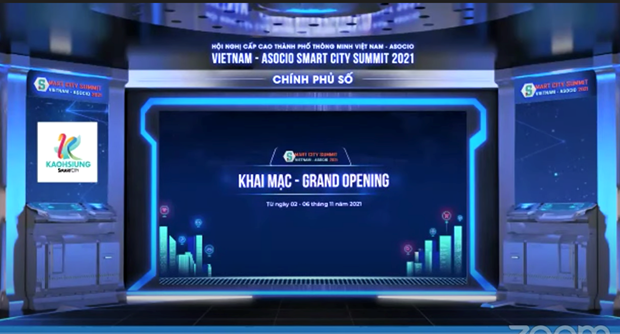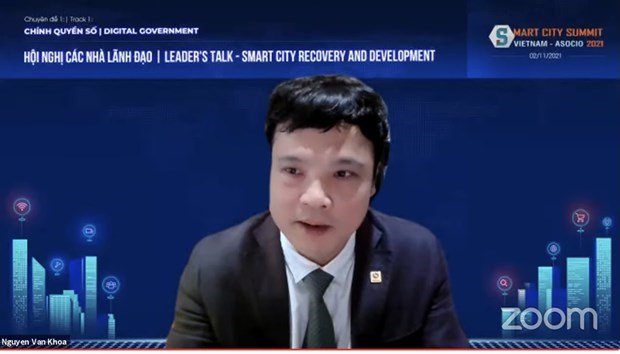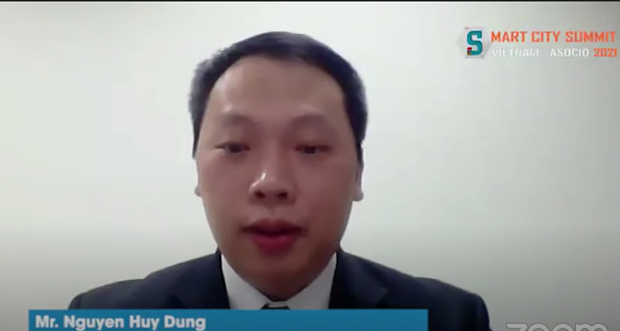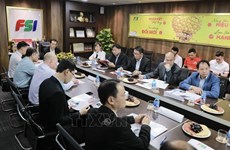Smart city development must be closely linked with digital transformation
The Vietnam- ASOCIO Smart City Summit 2021 kicked off virtually on November 2, highlighting that the outbreak of the COVID-19 pandemic over the past two years has sped up the development of smart cities.
 The Vietnam- ASOCIO Smart City Summit 2021 kicked off virtually on November 2. (Photo: VNA)
The Vietnam- ASOCIO Smart City Summit 2021 kicked off virtually on November 2. (Photo: VNA)According to Deputy Minister of Information and Communications Nguyen Huy Dung, smart city development in Vietnam cannot be separated but must be closely linked with the digital transformation process.
Jointly held by the Vietnam Software Association (VINASA) and the Asian-Oceanian Computing Industry Organisation (ASOCIO), the five-day event brought together representatives from 59 cities and provinces, and was linked to 70 locations.
The summit emphasizes on modern technology trends applied in developing smart cities with five seminars focusing on such topics as digital government, smart property, smart industrial property, digital transformation for smart producers and factories, and digital solutions and startups with smart cities.
Urgent needs
Developing smart cities has become an inevitable trend, Deputy Minister Dung said, noting that the Vietnamese government has issued Decision No. 950/QD-TTg approving the project on the sustainable development of smart cities for 2018-2025, with orientations to 2030.
The Politburo has also issued Resolution No. 52-NQ/TW on a number of guidelines and policies on proactively joining the fourth Industrial Revolution, which sets the target of having at least three smart cities in northern, central and southern key economic regions by 2025.
By 2030, a number of smart city chains will be formed in the northern, southern and central key economic regions, step by step connecting to the smart city networks in the region and the world.
 Nguyen Van Khoa, President of VINASA. (Photo: VNA)
Nguyen Van Khoa, President of VINASA. (Photo: VNA)Over the past two years, the pandemic has promoted the building and development of smart cities with issues related to data collection and management, solutions to pandemic combat, operation and management of cities and provinces, especially during the recovery and development period, he said.
Khoa said along with digital transformation, smart cities are becoming the new development mode of urban areas in the era of intelligentization. They are helping cities to optimize resources, develop sustainably, and bring safety and convenience to people, thus promoting prosperous socio-economic development.
Smart city development linked with digital transformation in localities
 Deputy Minister of Information and Communications Nguyen Huy Dung. (Photo: VNA)
Deputy Minister of Information and Communications Nguyen Huy Dung. (Photo: VNA)Deputy Minister of Information and Communications Nguyen Huy Dung said in recent years, smart city development was an issue that had received the attention of many localities across the country.
Some localities have started to apply the smart city model and have achieved positive initial results. However, it is still a new model not only for Vietnam but also for countries that applied the model before Vietnam, Dung said.
“It requires us to constantly study, exchange experience and draw lessons both domestically and internationally to serve the development of smart cities in Vietnam,” he noted.
“During the COVID-19 pandemic, some smart cities around the world failed to protect people's lives and health from the spread of the disease. The pandemic has taught us an expensive but very valuable lesson: it is imperative to seriously review the limitations and then set directions for the deployment of smart cities in the future.”
With its mission of leading and orienting the process of national digital transformation, including information and communications technology (ICT), for smart-city development, the ministry has made efforts to coordinate with relevant ministries, localities and international agencies to promote the deployment of smart cities in Vietnam, the deputy minister said.
The ministry has already issued guiding documents to create a legal framework for smart city development, including the ICT Reference Framework, the Key Performance Indicators (KPIs) for Smart Cities and the guidance of the IT application to provide services and utilities in the smart city, he said.
Vietnam has been accelerating the national digital transformation process, he said, expressing his belief that smart city development is also the implementation of digital transformation in localities./.












